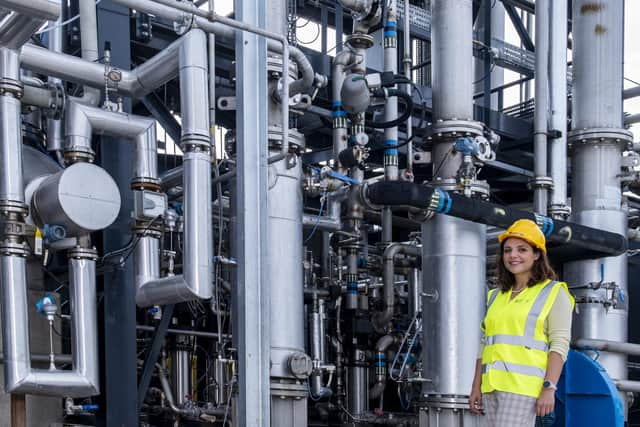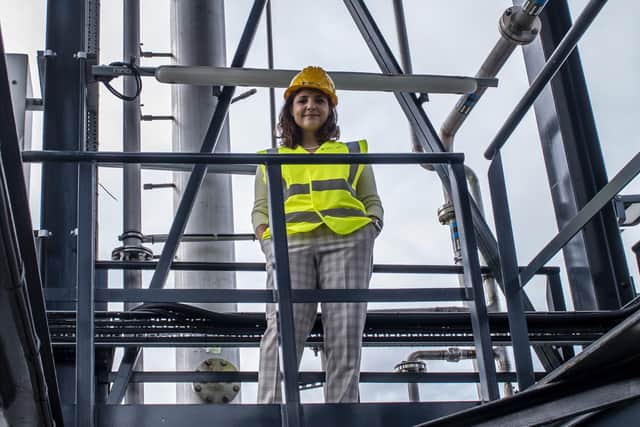How carbon capture research in Yorkshire is key in helping UK to meet net-zero targets
It is not enough, warns the University of Sheffield lecturer and researcher, to capture and negate CO2 emissions coming out of industry today.
Without also capturing some of the greenhouse gas already emitted into the atmosphere, “we’re not going to be able to mitigate catastrophic climate change in the years to come”.
Advertisement
Hide AdAdvertisement
Hide AdDr Samson is a lecturer in fuels and combustion in the department of mechanical engineering. She is also a member of the university’s energy engineering group and its Energy Institute, a centre focused on finding low-carbon solutions to the world’s biggest energy challenges.


Dr Samson’s research deals with the development of low-carbon and sustainable energy and fuels including fundamental studies on pollution control, materials recovery and carbon capture. The latter, in particular, is said to be key in helping to achieve net-zero greenhouse gas emissions by 2050.
Dr Samson’s research group is looking at “the most promising ways” of capturing carbon dioxide from “difficult-to-decarbonise industries” through post-combustion carbon capture. That process involves capturing the gas as it is coming out of a flue, before it is released into the atmosphere.
The team is also exploring capturing the gas back out of the atmosphere once it has been emitted and dispersed – a process known as direct air carbon capture.
Advertisement
Hide AdAdvertisement
Hide AdAs well as laboratory research, she works hand-in-hand with industry, and has access to The Translational Energy Research Centre, one of the largest and best-equipped zero-carbon energy research and development facilities in Europe. Based at the university as part of the Energy Institute, the centre has capability to test, optimise and demonstrate technologies at scale, with techniques then able to be applied around the world to address critical energy challenges.


Dr Samson, who first studied chemical engineering and previously researched biomass energy, also collaborates with the UK Carbon Capture and Storage Research Community (UKCCSRC). The community describes its mission as being “to ensure that carbon capture and storage plays an effective role in helping the UK achieve net-zero greenhouse gas emissions by 2050”.
Asked about the significance of carbon capture research, she says: “It’s important not just for the UK and putting us at the forefront of leading this globally but also because if we don’t capture the carbon dioxide coming out of our industry, there’s no way we are going to be able to reach our net zero targets by 2050 and avoid catastrophic climate change in years to come.
"Even if we stopped everything tomorrow, which of course we can’t, we’d still have to take some of the carbon dioxide out of the atmosphere that we’ve already put out there…This research is critical for us to be able to make sure the planet is a nice place to live for our children and their children.”
Advertisement
Hide AdAdvertisement
Hide AdEarlier this year, Prime Minister Rishi Sunak committed up to £20bn for early deployment of carbon capture, utilisation and storage (CCUS), for Harbour Energy’s Viking project in the Humber and the Acorn project in Scotland. In a bid to reach net zero, the Government is aiming to ensure 20m to 30m tonnes of carbon dioxide is captured each year by 2030.
Harbour Energy claims its scheme in the Humber could capture up to 10m tonnes a year by 2030, stopping it from polluting the atmosphere, and it is able to store around 300m tonnes in the “depleted Viking gas fields”. Linda Cook, chief executive of Harbour Energy, has previously said it has the potential to be “transformational for the Humber, the UK's most carbon intensive industrial region, creating thousands of jobs in the area and playing a vital role in supporting the UK to meet its target”.
Some environmentalists worry the focus on carbon capture technology will distract from and undermine efforts to phase out fossil fuels and claim the Government should be working to drastically reduce greenhouse gas emissions.
Concerns have also been raised about the cost being “too expensive”. “I don’t think it ever will be economically viable if you’re looking at it in terms of generating revenue,” Dr Samson says. “But it’s something we absolutely have to do...It’s a very exciting field to be working in and an exciting time for the UK in general to have a chance to make a global difference.”
